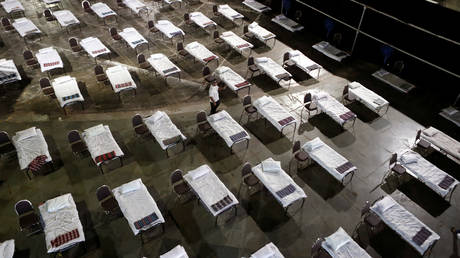
India has seen its greatest surge in new coronavirus cases since its outbreak began, counting over 1,000 infections in the space of one day, according to the Ministry of Health and Family Welfare.
The spate of new Covid-19 patients, 1,035 on Friday alone, sends India’s total disease toll to 7,447, ANI reported, citing health officials. Forty new deaths were also recorded on the same day, added to the nearly 200 already accounted for.
The sudden increase in infections comes as regional authorities look to track down members of Tablighi Jamaat, a Muslim religious community, after thousands of adherents attended a crowded gathering in Delhi in mid-March, stoking concerns that the group has helped to spread the virus far and wide across India. More than 1,000 of the group’s members have tested positive for the illness, according to figures reported by the Times of India last week, which accounted for 30 percent of all 2,900 cases in the country at the time.
While India’s case and fatality figures continue to climb, New Delhi is preparing to ship out its first delivery of hydroxychloroquine (HCQ) – an anti-malarial drug that has shown early promise as a treatment for Covid-19 – to 13 of the hardest-hit nations. The US, Spain, and Germany, who between them count nearly half of the world’s total cases, will be among the first to receive the drug, which has entered clinical trials in the US and elsewhere.
Though New Delhi previously imposed a blanket export ban on HCQ, barring even emergency humanitarian shipments, after a brief row with Washington and threats of “retaliation” from US President Donald Trump, the restriction was overturned.
“A lot of requests for HCQ were already there,” Dammu Ravi, an official with the Ministry of External Affairs, told reporters on Friday, adding “A decision was taken by the Group of Ministers to release some of the surplus medicine for export purposes.”
Two more shipments will follow, Ravi said, the second of which will supply the US, Canada, Germany, and Brazil with 4.8 million tablets of the highly-demanded medicine each, along with quantities of its raw ingredients. Other countries with smaller outbreaks will receive less, including Bangladesh, Nepal, Bhutan, Sri Lanka, Afghanistan, and the Maldives.
Like this story? Share it with a friend!




